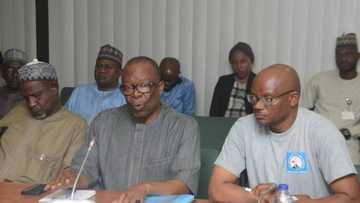Why 99.9% of ASUU Strikes Can’t Pass Scrutiny of Law in Nigeria - Prominent Law Lecturer Discloses
- Following the 7 months ASUU strike in Nigeria, Misbau Lateef, a law teacher from the University of Hull, disclosed to legit.ng that the strike is illegal
- Lateef, who taught law at Obafemi Awolowo University (OAU), Ile-Ife, before moving to the United Kingdom, is the national legal adviser of CONUA, a breakaway group from ASUU
- The lecturer maintains that none of the strikes embarked on either by ASUU, NLC, or other unions can't pass the scrutiny of law in Nigeria because no strike is expected to last more than 5 days
PAY ATTENTION: Click “See First” under the “Following” tab to see Legit.ng News on your Facebook News Feed!
Being a member of the university community and a member of CONUA, Misbau Lateef understands the problem with ASUU and what CONUA is fighting for. At the same time, he told Legit.ng the way forward in the whole issue.
Let me start by saying whatever I say now, I'll be saying it in my personal capacity as Misbau Alamu Lateef, a law teacher and then a member of CONUA and proudly so, and CONUA, I mean Congress of University Academics, which is a trade union of university lecturers in Nigeria, which is trying to get registered by the ministry of labour and Industry. So, we are yet to obtain our certificate, but the processes are almost completed.

Source: Facebook
So, I will be speaking personally for myself, whatever I say is my personal opinion. Because I do not have the authority to speak for CONUA or to represent CONUA.
Now, having clarified that my understanding of the ASUU/Federal Government issue, in summary, is that, over the years, funding for tertiary education in Nigeria has been anything, but I will say adequately insufficient.
PAY ATTENTION: Share your outstanding story with our editors! Please reach us through info@corp.legit.ng!
Put differently, the Federal Government of Nigeria has not, for quite, I will say, maybe for almost five decades or more now or maybe four decades at least from the 80s has not been sufficiently funding tertiary education in Nigeria.
As a result of that, our universities have progressively witnessed a decline in quality, and when I say quality, I mean the quality of teaching, the quality of research and the quality of community engagement.
These are the three components of what a university teacher does: teach, research, and engage with your community. Something that people call the bridge between the town and the gown.
What UNESCO recommended for education budget
The legal practitioner maintained that Nigeria's budgetary allocation to education has never met the UNESCO standard over the years.
According to the UNESCO recommendation, I think no less than 21% or thereabout is expected or required to go to education. In Nigeria over time, the budgetary allocation to tertiary education, in particular, has never exited 7,8,9%.
I can't remember any time when we even had up to 10% or something like that.
So basically, there has been consistent and progressive abysmal funding of tertiary education.
Stakeholders have always agitated for improvement in the system
He stressed that because the government failed to meet up with the standard, stakeholders in the sector have always agitated for improvement
Now, because of this and legitimately, stakeholders in tertiary education, particularly the teachers, generally or mostly represented by ASUU, have also continuously agitated for improvement in the system.
This agitation for improvement over time has led to a series of negotiations, discussions, deliberations, meetings and even agreements between the government and ASUU on one hand and then between the government and other stakeholders like SSANU, NASU and other trade unions within the university community.
Lack of funding killing Nigerian universities
Lateef said that university lecturers have kept agitating for proper funding of the universities because things are getting worst in the system due to lack of funding.
Over time, we have consistently witnessed declines in our educational system because of funding.
This has also affected the facilities, the universities are overcrowded, and the students' hostels or accommodations are hardly worthy of inhabiting human beings. Even the lecture theatres and the libraries are hardly stocked with books or current books. The resource material and everything.
These are the kind of challenges that are bedevilling our tertiary education. As I said, stakeholders, particularly the university teachers, are always agitating.
So, in that line, ASUU has had to go on strike. When I say all of these things, I am not trying to speak for ASUU. Clearly, I don’t have that authority. I am just trying to put everything in its proper perspective by giving a background to where I will get to shortly.
Why should workers go on strike?
However, the legal luminary then pointed out the legality of strike and the relevant laws that supported it

Read also
May 29: Ex-APC presidential aspirant downplays threat of parallel govt, sends message to Nigerians
Of course, the strike is an industrial relation tool by which workers or employees, and by law, it is a constitutional right, or I will say Labour law right.
Employees are, by law, empowered or entitled to declare a strike, and employers, too, are by law empowered to declare a lockout.
The relevant laws in Nigeria for these included the trade dispute act, for example, or the trade union act.
How many time has ASUU gone on strike?
He lamented the fruitlessness of long industrial action embarked upon by the academic lecturers.
Basically, ASUU has consistently, and then this particular strike, which has lasted for 7 months.
The government, the ASUU, have gone back and front, trying to resolve it.
Almost all stakeholders that you can think of have tried to intervene, the committee of vice-chancellors, different committees from the ministry of education, the ministry of labour and employment and all of that.
But they have not been able to resolve it, and the schools have remained shut for 7 months.
Why some lecturers are against ASUU?
Lateef and others that are against ASUU's incessant strikes are asking why same things are being done without getting the result
Now, the challenge that some of us have, now talking about myself again and the group that I belong to, CONUA, is that, yes, the government has not been responsible enough over the years to fund tertiary education sufficiently as they should.
Yes, there is so much decline in the system; yes, lecturers are poorly paid in fact, lecturers are miserably paid, they are paid something that you cannot even call a proper take-home benefit and all of that.
So if this is the case, what should be the way out or the approach to confronting the government that has consistently failed?
Where ASUU gets it wrong
The belief of ASUU that strike is the only language government understands is wrong.
So, in the opinion of some teachers, this is where I think ASUU fall.
They think the only language that government understands is the strike. Therefore, they can remain or decide to be on strike for as long as the government begins to hear them.
What CONUA believes in?
But then, there are some of us, speaking about myself again and the group that I belong to, who think that strike is not supposed to be a disruptive stool, strike as a tool for industrial relation engagement, is supposed to be constructive.
By constructive tool, I mean the idea of a strike is for a worker to put down tools or say we withhold your services when you do that, the law, even the practice, or even the theory, if you like, does not envisage that you do that permanently when you have not decided that you are leaving your employment.
The idea of strike should not exceed 5 days
So, basically, the idea of a strike, in the view of some of us and in my own personal view, is that a proper strike that is constructive and not destructive should not last, and this is arbitrary, what I want to say now, I mean what I am saying now is accorded with the standard in other places, so, a constructive strike should not exceed maybe a maximum of five days.
I mean maximum, so, when you withhold your services for me, you do that maybe compel or force your employer to the negotiating table or negotiation table as the case may b, to compel them to discuss, to compel them to negotiate.
ASUU strike is destructive, not constructive
But when you now employ strike as a tool for destruction, such that you believe you can shut down or you can withhold your services and thereby shutting down the business of your employer for as long as you want, then for me, that becomes an anathema.
A supposed solution itself will become a problem, and this is what I think the strike in the hand of ASUU has become in Nigeria.
In my humble view, a strike for them (ASUU) is no longer a constructive tool to compel the employer to do the right thing.
What is now the way forward if strikes would not solve the problem?
The way forward is that, you see, we don’t need to pretend about this, if we look at the origin of strikes, the most part of it was when we were under the military when there was this idea of militancy.
You know, the military rule by decree, they don't believe in concessions, they don't believe in agreement, and then, that, in a way, cultivated a militant approach from the trade unions.
But we are now in democracy. We return to Democracy in 1999, which is almost 20 years now or so, so the way forward is that you continue to negotiate, as you know.

Read also
Finance, healthcare for veterans: 5 Things entertainment industry stands to benefit from Tinubu's presidency
We continue to say this, but some people don't seem to agree, they are saying no, government is deaf, the government does not hear anything than strike.
You can't cut your nose to spite your face
Okay, do you cut your nose to spite your face? If you say the government does not listen to things other than strike, does that mean that you shut them permanently for one-month, two-month, three-month, to 8 months?
How exactly does that help the system you are planning to build or hoping to build?
So, the way out basically is that people should continue to engage, they should continue to discuss. Is that not exactly what the national industrial court has just done?
What the law contemplates
You see, contemplation of the law, particularly the trade dispute act, if you look at it from sections 17 and 18, is that once the minister of Labour and productivity or whoever is designated in that fashion, apprehended an industrial dispute, by apprehension, he or she has taken charge. he has seen the situation, parties should continue to do their work while they continue to discuss

Read also
May 29 handover: How banditry, CBN Naira redesign policy, Twitter ban, medical trips tainted Buhari’s legacies
You don't say that because discussion or negotiation has not yielded, then you will continue to withhold your services as permanently or as long as you can, that is anathema.
That is no longer a constructive strike, it is destructive. For me, basically, the way out is that they should continue to negotiate, they should continue to discuss.
What the labour law says about strikes
Under labour law, there is no compulsion to take up any employment, no employer should force any employee to work for them, and no employee should also force.
Public service employees in Nigeria have the messianic mentality of indispensability
You know, I don’t want to appear insensitive here, but the truth is that, with all sense of responsibility, the public service employee in Nigeria, I think they have this messianic mentality of indispensability.
I will explain that. They think that they are messiahs, they think that they are the only class of people who, you know, can rescue the society from whatever challenges it is facing, so they have this messianic mentality of indispensable.
That we are indispensable, and no government can do without us.
Why ASUU do not have the right to shut down schools
Instead of shutting down your employer's business, you have the right and the choice to leave the job. Yes, as insensitive as this may appear, I acknowledge it is the truth.
So, the point is that why shut down the system when you can as well decide to walk away?
And if you walk away, wouldn’t that put your employer under some sort of pressure or embarrassment?
But some people will say no, that is not patriotic, they want to save the university system, and this is why or where the Messianic word that I used earlier comes in again.
So, when employees have that mentality that they are the messiah, we are the only people who can rescue the system, then for them to admit that they have their own excesses, too, becomes a problem.
For me, and I want to really emphasize this, it is not rocket science, the only way to the solution is that parties who don't want to leave their job should continue to negotiate for improvement in their condition of service
You can not sustainably withhold your services for months and expect that you are not doing much damage.
Comparing ASUU to private sector employees
Let me bring in the private sector perspective here, some people might say no, federal universities are peculiar, and that is, for me, laughable.
If you have a company and then, let's say you produce something that your neighbourhood relies so much upon, let’s say you produce sachet water, a common thing in Nigeria and then you have issues with your employee.
Let’s say you have 20 of them who are the productive employee, I mean, in the productive sector of your business, they are the ones who man your machine, they are the ones who do all of this and all of that for you, then you have an industrial dispute with them, and you could not agree.

Read also
AMVCA 2023: A night of shame, controversies, false winners, power outage and IK trolls Toke & Deyemi
Why is negotiation inevitable?
One, you’re not denying their rights to a better condition of service, you’re probably saying maybe you don't have the means, you’re probably saying maybe you have a better alternative or maybe another alternative to it, but then, they now decided to shut down your business and thereby, stopped you from doing business.
The people, the customers that you supply water to, couldn’t have access to your product again, you couldn’t make revenue, or you couldn’t make money again and all of that.
So, my point is that would you rather not sack those employees?
I'm not by this saying government should sack lecturers, please, I don't want to be misquoted.
What I'm saying is that employees do not have the absolute right to withhold their services for as long as they want for as long as a desire.
The employer cannot compel anyone to work for him. The best thing for an employee is to walk away from a job that doesn't give you the best that you think you deserve rather than destroying the business.
Nobody is talking about the effect of the ASUU strike on the students
In all of these, so far, you can see the people focus only on the academic teachers or ASUU and then the government, nobody is talking about the children or the students.
The standard practice elsewhere is that students are treated as consumers, and as consumers, the employer of the teachers, that is, the government, or the governing council, has the case may be, and then the teachers themselves don't have any right under the law to have or to engage themselves in such a way as to affect the right of the consumers.
So, the students have become, I will say, the victims of the government's perennially irresponsibility and failure to do the right thing.
Also, I will say, ASUU intransigent. Intransigent in the sense that I want to be extremely sensitive here because this is my background, I belong to this circle, I mean, intellectual university teachers and all of that, but that is not to say if something is amiss on our part, I should not point it out.
ASUU should rethink its methodology for engaging government
For me really, I think ASUU, in particular, should rethink their methodology for engaging with the government.
This idea of going on strike ad-infinitum belongs to, I will say, forgotten past. It does not belong to this age.
By the way a stable and steady academic calendar is central to quality control in a university system. I mean if your calendar is not stable or is not steady, it goes to the quality of your product, the student and services that you provide.
The schools have been shut for seven months for example, now the question is if some of the challenges are addressed and teachers go back to school tomorrow, I want you to answer this as a journalist, and I believe you investigate.
How exactly would that have repaired the laboratory that has not been used for several months and has not been equipped or that has been abandoned? How many books will that add to the library?
Things deteriorate when you shut down
So, the point is, when you shut down, things deteriorate, and things get even worse.
But when you continue to negotiate and discuss while you run the system, the kind of deterioration that you witness when you shut down, you won't experience it.
Migration is a fundamental practice in human sociology
People talk about people migrating, my brother, people have always been migrating, even before now.
I tell you, mobility of labour or migration is a fundamental practice in human sociology.
People always migrate, even when the system was better than it is now, people have always migrated.
I know people who left, I don't want to mention the school, it is a federal university in the southwest, I know people who left that system some 20 years ago, they went for one programme, my brother, but they never return to the system, people have always migrated.
Well, you can say that the tempo has increased, maybe I cannot dispute that, but the point is people have always migrated.
Migration is a natural human phenomenon, nobody can stop that.
Why I oppose the ASUU strike - Lateef
But the idea of trying to solve a problem by creating more problems is what someone like me is opposed to. So, I don’t believe in strikes, I mean prolonged strikes. In fact, for any strike that exits five days for me, I will never support it, no matter what.
Thank you very much, can you comment on the order of the Industrial Court of Nigeria and the appeal ASUU is making?
First and foremost, I have seen the laughable things that some people say about the government approaching the national industrial court.
And I say laughable because those things are very, very ridiculous.
In the sense people say, oh government should not have gone to the national industrial court, going to that court has complicated things, and going to that court is bad, I even listen to the ASUU president on Channels Television saying that it was only under the military that this kind of thing happened last.
Now, Let me quickly go back to what I said earlier, I said something earlier that public service employees in Nigeria have this messianic mentality of indispensability, they think they are messiahs.
What I didn’t say earlier is that they see themselves as being above the law. They don't always want the regular law to apply to them, they feel we, in the public service, are short of what we called, in the Yoruba language, permeate me, omo ijoba (government’s child).
We are above the law, nobody can touch us, we are untouchable, if not people will not be talking about the national industrial court in such a ridiculous way they have been talking about it.
What national industrial court stands for
I said this because the national industrial court is a specialised court set up under section 254 of the Constitution of Nigeria to address Labour and industrial-related issue.
So, if you have a specialised Court in your country which was established solely to deal with Labour and industrial matters, why should anyone be worried that a government took an industrial dispute before the court?
Why is ASUU running away from the court? Why are they afraid of the court now?
Before we talk about the agreement, have you wondered why ASUU has never approached the court?
Have you wondered why the NLC has never approached the court? Have you wondered why NUPENG has never approached the court? Have you wondered why PENGASAN has ever approached a court?
Or maybe, don't let me say they have never, they don't always approach the court.
The best thing government has done so far is approach national industrial court
The reason is very simple, again, they don't always want to go to court because they don't seem to trust the system, and that's another problem.

Read also
BREAKING: FG moves to clip ASUU's wing, sets to present certificate of registration to factional group
So for me, there's nothing wrong with the government taking ASUU to the national industrial court, and I think it is the best thing the government has done so far.
You will even commend the government for waiting so long, you know they explore all other possibilities, I am not speaking for the government here, I'm just being honest with myself and true to my conscience.
The government has waited so long before approaching that court, a specialised court for that particular purpose.
So, if they don’t go there, where else should they go?
99.9% of strikes in Nigeria are illegal
They have been negotiating, meeting for 7 months, going back and forth for 7 months, and nothing has come out of it.
And then decided to approach a court established by the constitution for that particular purpose. So, why should anyone condemn that court? Why should anyone condemn that process?
Again, because people are always not, I will say, keen in approaching the court, and they do that also because, I want say with all sense of responsibility, 99.9% of strikes that the NLC, ASUU, NUPENG, PENGASSAN have always embarked upon in Nigeria are illegal.
I'm telling you, none of them can pass the scrutiny of the law in Nigeria.
ASUU should have approached national industrial court if government has breached any agreement
So because of that, they are not always inclined to go to court.
Now ASUU has claimed, for example, that the government breached agreements. Why has ASUU not found it worthy of approaching the national industrial court?
To say we had an agreement in 2009 and we had another one in 2014? So, if this union if they believe in the due process of our law, why don’t they continue to work? By that, I mean they continue their work and allow the national industrial court to interpret the law.
2 reasons why ASUU has not approached the national industrial court
For me, they have not done that for two reasons. One, it is either the agreement is not enforceable, I'm not saying so, or as I said earlier, they don't believe in the system.
What did they believe in? I believe they believe in propaganda, they believe in blackmail, they believe in intimidation, and they believe in this particular strike.
Using strike as a tool to intimidate, you won't find that in the private service sector or private sector employment.
You will never find it, you will never see employees of banks doing that, and it's not that the banks are not oppressing them, no.
Employees have the right to withhold their services, and employers also have right to terminate employment
Those employees know the limitation of their right in labour, or an employee has a right to disservice, but that is not absolute.

Read also
ASUU strike will only end permanently when more private universities are established, says Imumolen
So, when you withholding your right has now become a clog in the wheel of the employers’ progress, the employer also has a right to terminate your employment.
I want you to talk about what is likely to happen if ASUU does not obey the court order?
Okay, I am coming, I will quickly say that you won’t see bank employees, for example, embark on strike indefinitely, you won’t see anybody in the private sector doing that because they know that it will not be legal.
So, all of these indefinite strikes things are only possible in the public service sector because of that messianic mentality of indispensability, we are above the law; we can blackmail the government.
Unfortunately, if ASUU does not obey the court order, that will also be another breach of the law.
ASUU will pay N1000 if it did not obey the court order
Section 18(2) of the trade dispute act actually says whoever disobeys an order of the court to go back to work, such person may be fined, maybe imprisoned for six months, and I think the fine will be N100, and if it is an organization will be fine for N1000.

Read also
Nigeria at 62: "We must shun the theatrics of politicians, our diversity is our strength", says DG NILDS
That is to tell you that the law does not take this thing with levity. Section 18(1) of the trade dispute act, which empowers the national industrial court to order workers to go back to work, also reinforces the power of the court under section 18(2), which says whoever disobeys the order may go to prison.
Of course, I know we will not get there, but the point is that disobeying the court order would be contempt.
ASUU has the right to appeal the court's judgment
ASUU has the right to go to the court of appeal as they have done. They have the right under the law because any judgment or ruling from the national industrial court is appealable to the court of appeal
But the question is, can ASUU sustain its appeal when it has not complied with the order of the National Industrial Court? The answer is no.

Read also
ASUU strike: We will ensure govt waves registration, hostel fees, pays students, says NANS president
What can ASUU do if it does not want to obey a court order?
As a matter of Law, you can be a contempt law. Somebody who is in contempt of court and still approaching another court.
However, if ASUU does not want to comply with that order and they still want to maintain its appeal, there's only one thing they can do.
They will have to go back to that same National industrial court and obtain what we call a stay of execution of judgment.
Meaning that they will pray that we are going to appeal this judgment or ruling that you have passed on us, we want you to stay execution so that we don't comply with it why we prosecute our appeal.
Now, if they’re not able to do that at the national industrial court, which is possible, they may actually file the same application at the court of appeal. Asking the court of appeal that we have lay before you an appeal in respect of so so so ruling.

Read also
More private and digital universities should be given operational license, says Prof Imumolen
However, we want you to give us an order to stay the execution of that ruling or order while we prosecute our appeal before you.
Why ASUU may never win in court
Now, as a lawyer, I am not trained to speculate exactly on what the judge will do or what may happen at the higher court, but I'm trained to use my understanding of precedents to have limited speculation if you allow me.
So, in my opinion, the likelihood of ASUU securing an order of stay of execution either at the national industrial court or at the court of appeal is very low because the law at this time, and as I said earlier, does not support their course.
No law envisages workers withholding their services for long
There is no law of any responsible country that will envisage workers withholding their services for this long, that is not how any responsible country is run.
You can blame the Federal Government till tomorrow and have used the word irresponsible to characterize the failure of the government.
I'm not speaking for the government, I'm just being realistic here. So, if you say the government is bad.
On our own path, we should be able also to take our own fair share of the blame. Our fair share is that you have the right to say I'm not doing this job again.
Source: Legit.ng





















